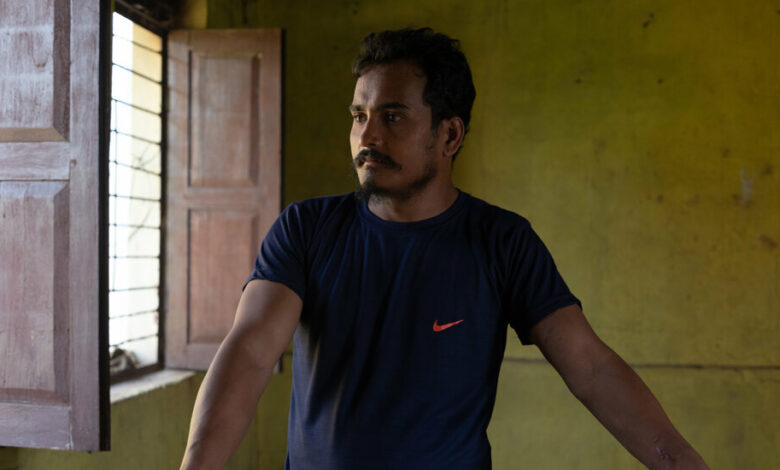How to Escape From the Russian Army

He didn’t have any documents.
Or money.
Or even a phone.
He was wrapped in bandages and 2,500 miles from his village in the Himalayas.
But as he lay in a Russian military hospital, wounded in battle and surrounded by people speaking an alien language, Krishna Bahadur Shahi, an out-of-work engineer from Nepal who had committed the mistake of joining Moscow’s army, made a vow.
Somehow, he told himself, I’m getting home.
“I had to get out,” he said in a recent interview. “I was even thinking of killing myself. I knew if I didn’t leave that hospital, they would send me back to the front and if they did that, well, there would be no possibility of returning alive.”
Mr. Shahi had become ensnared in the shadowy, predatory underworld of human traffickers from Nepal who supply foreign fighters to the Russian army for its war in Ukraine. The Nepali government has been trying to shut down this pipeline. But the Russian military continues to rely on it, boosting combat power with impoverished young foreigners even though many, like Mr. Shahi, said they didn’t know they would be going into battle.
More and more are trying to get out. Mr. Shahi actually tried to escape twice. The first time he was ratted out by his own smugglers.
“Get me a cellphone. I pay you later.”
Mr. Shahi is a thoughtful, talkative, fit 24-year-old civil engineer from a village in the Dailekh area of western Nepal. A university graduate, he faced grim job prospects after finishing a short-term contract building water tanks last year. Nepal is one of the poorest countries in Asia, and his parents, who are millet farmers, have little money.
He joined the Russian army for one reason, he said: “For the money.” The New York Times corroborated Mr. Shahi’s story through medical records, photographs, text messages and official government documents.
Former Nepali soldiers in his village introduced him to human traffickers, he said, who quickly arranged for him to fly to Moscow. The deal looked solid. He’d pay the traffickers $5,600. In Russia he’d make $2,200 a month as a contract soldier, working as a guard at a base, he was told, not on the front line. Soon, he would get Russian citizenship as a reward for his service.
As he prepared to leave for Russia, Mr. Shahi was stepping into a well-established web of middlemen and human traffickers that carries thousands of Nepalis each year to wealthier countries to work as maids, prostitutes, guards, nannies, cooks and soldiers.
“It’s a massive network,” said Kritu Bhandari, an anti-trafficking activist in Nepal’s capital, Kathmandu. She recently started a group called the Campaign to Save the Lives of Nepali Citizens in the Russian Army.
She said the traffickers falsify education certificates to obtain visas; mislead recruits about what they will actually be doing; and run a wide syndicate of agents and accomplices that stretches from rural mountain villages to foreign capitals and the corridors of their own government.
“The smugglers even have people at immigration in the Kathmandu airport,” she said.
The Russian government has not revealed much information about foreigners fighting for its army but news reports and interviews indicate that Nepal is one of the leading sources. Last year, Nepali police arrested a dozen people in connection with the illicit trafficking of youths to Russia, but the vast majority are never caught.
Mr. Shahi arrived at a Russian army base a few hours’ drive east of Moscow in late October, he said. He provided photos of himself dressed in crisp camouflage and a hat with earflaps. In one picture, he’s holding a snowball.
The base was used for several hundred Nepali and a few Chinese recruits, he said. His first impressions, formed from the uniforms, the weapons, the training and the transport, was that the Russian army was centralized and organized. That impression would soon change.
After two weeks of basic training — he had been promised three months, he said — he was told that he was going to a frontline position near Donetsk, a Ukrainian city occupied by Russian troops.
Terrified and feeling betrayed, he tried to protest, saying that he wasn’t ready, and that he’d rather sit in jail. But that wasn’t an option.
“Even inmates there are taken to the front line,” he said. “I had to go.”
His frontline unit was a mix of Russian convicts and his fellow Nepalis. The “inmates,” as he called them, were heavy drinkers, coarse, unpredictable and covered in tattoos.
“They were not lovely,” he said sardonically.
They constantly abused the Nepalis, he said, slapping them in the helmet, jabbing them with gunbutts and screaming at them in Russian. Mr. Shahi said he learned only a few words, including right and left, but sometimes, during the chaos of combat, he got those confused.
After an artillery barrage in December wiped out three of his friends, he decided to make a break for it. His wife, Alisha, back in Kathmandu, spoke to a Nepali living in Moscow who connected Mr. Shahi to traffickers working inside Russia. They put together a plan: He’d pay 4,000 euros, in installments, and the traffickers would arrange for a car to take him from Donetsk to Mariupol, and then to Moscow.
The traffickers make a cut either way — getting people in and getting them out.
Mr. Shahi and a small group of other Nepali deserters left their positions, linked up with a couple of taxis and made it to a half-destroyed apartment in Mariupol, perhaps the most ruined city in Ukraine and under Russian occupation. “The whole place looked doomed,” he said.
They slept on the floor.
But the traffickers, he said, didn’t have a good exit plan. Two of their group tried slipping across the border into Russia and were arrested at a checkpoint. When Mr. Shahi and the others hesitated to pay the next installment, “the dispute got nasty,” he said.
A few days later, at 4 a.m., a squad of police officers showed up and arrested everybody. The traffickers, Mr. Shahi said, had shared the location of their hide-out and betrayed them.
They were arrested and beaten, he said. Mr. Shahi begged for mercy, saying they were just Nepali students trying to get to Europe. But while they were waiting in a Mariupol jail, the police received an electronic bulletin from the Russian army that they were looking for some Nepali deserters. The game was up.
Russian soldiers hauled them back to a frontline position in Donetsk, this time a bunker filled with snow. He said they had almost no food or water. They ate ice. And cans of stringy, frozen beef, which was against Mr. Shahi’s Hindu religion.
“But what was I supposed to do?” he said.
Mr. Shahi and the half dozen Nepalis with him had no freedom to leave, retreat or do anything but stay in that bunker and fight.
“I was a slave,” he said.
A few days later, Mr. Shahi said, the Russian commanders took them out and ordered them to storm a heavily fortified Ukrainian trench line. The Ukrainians saw them coming and lit up the forest with gunfire. Mr. Shahi was shot six times in his left arm and right leg.
Disoriented, faint and losing lots of blood, he crawled to a first aid station.
“I thought that was it,” he said.
In a haze of pain, he met some other Nepali soldiers and gave them his A.T.M. card and his mobile phone and told them to call his family back home and tell them he was no more.
But the Russians provided decent medical care, he said, and he was flown in an emergency chopper to a hospital in Rostov-on-Don, a Russian city near the Ukrainian border. Surgeons removed the bullets and patched up his wounds. Yet he fell into a depression so deep he contemplated suicide.
“I knew that as soon as I got better, they’d send me back,” he said. “And I couldn’t face that.”
Desperate to talk to his wife, he signaled to a tall, skinny orderly who was cleaning his room that he wanted to use his phone. The Russian man quickly understood and when Mr. Shahi said, “Nepali, Nepali,” the cleaner opened a translation app on his phone.
“Get me a cellphone. I pay you later,” was Mr. Shahi’s message.
The Russian man smiled.
The same day, a new phone appeared.
Google Translate
At any given moment, Nepali soldiers are trying to escape the Russian army. We spoke to 11 who succeeded.
Khakendra Khatri, an agricultural student from Rolpa, in central Nepal, said that in October he flew to Moscow with a planeload of 50 other Nepali recruits. At first, he said, they were all pumped up.
But during training, the recruits began sharing gory videos from the front line in Ukraine.
“That changed my mind,” Mr. Khatri said.
He said he bribed his Russian commander 17,000 rubles (about $200) to sneak out of his base, on the outskirts of Moscow, with two other Nepali soldiers. The three soon got lost in a forest.
They began to panic. In Russia, deserters are punished by military courts and can spend years in prison. But then they saw a taxi coming down a road and waved it down. Mr. Khatri said he frantically tapped open Google Translate on his phone and used it to tell the driver they were lost tourists and needed to get to Moscow. The driver took them all the way — 15 hours — and at the end, refused to take a single ruble.
Mr. Khatri worked with middlemen to get a flight to Kathmandu. Now back home in Rolpa, he said: “Some Russians are quite helpful. I could have died if that driver hadn’t helped us.”
Mr. Shahi had similar kind words for the Russian orderly. With the new phone, he spoke to his wife. She borrowed heavily from relatives — $8,000 this time — to pay another group of traffickers who said they could get her husband out.
On the morning of Jan. 23, Mr. Shahi gingerly stepped out of the Rostov hospital. He hobbled to a nearby market where a taxi was waiting for him. The driver communicated through a translation app, telling Mr. Shahi: Don’t talk. I’ll do the talking. If we get stopped, I’ll tell them you’re sick and headed to the hospital.
They drove all day to the one place that could help with the final stage of the escape: The Embassy of Nepal, in Moscow.
“Are you a soldier?”
For months, the families of missing Nepali soldiers have held protests and hunger strikes in front of the Russian embassy in Kathmandu. The Nepali government says at least 32 Nepali men have died fighting for Russia; the families of the missing believe there are many more.
In March, Nepal officially requested that Russia repatriate all Nepalis who had joined the Russian army, compensate any injured Nepali soldiers and send home any remains.
“They listened to our argument carefully,” said Amrit Bahadur Rai, a spokesman for Nepal’s foreign affairs ministry.
But Russia has yet to do anything, he said.
The Russian Embassy in Washington did not respond to emails asking for comment. Early on in the war, President Vladimir V. Putin of Russia welcomed foreign fighters in his army saying they were coming on “a voluntary basis, especially not for money” and that it was important to “help them move to the war zone.”
Nepal’s embassy in Moscow has been trying to help fugitive soldiers move out of the war zone. Many of them, Mr. Rai said, had been tricked by traffickers and were “desperate” to get out of combat.
Prakash Mani Paudel, director general of Nepal’s Department of Consular Services, said the embassy has helped 110 Nepalis escape, including Mr. Shahi, who had lost his passport in Donetsk and needed a temporary travel document, which the embassy quickly furnished.
The last step in Mr. Shahi’s odyssey was Moscow’s Domodedovo airport.
Dressed in black jeans and a black puffy jacket, Mr. Shahi limped into the terminal building around 8 p.m. on Jan. 24. There he met an older Indian gentleman wearing a sports jacket and slacks, who had been hired as part of the $8,000 trafficking package, Mr. Shahi said. He helped with the check-in for the flight to Sharjah, in the United Arab Emirates, the first leg of the trip back to Kathmandu.
But Mr. Shahi stood out. He had shrapnel scars on his cheek. His left arm and right leg were covered in bandages. He could barely walk. And he was stocky and of military age.
At the immigration desk, four tall Russian border police agents surrounded him. The Indian gentlemen disappeared. The police took Mr. Shahi into another room and ordered him to strip to his underwear.
“What battalion are you in?”
“Are you a soldier?”
“Your hand’s injured. There are better hospitals in Russia. Why are you returning to Nepal?”
Mr. Shahi said his body began to tremble. “I was thinking I wasn’t going to make it.”
The Russians were using a phone and translation app and Mr. Shahi pretended that he didn’t understand.
With 15 minutes before takeoff, they let him go.
“I think they realized I was no use to them anymore,” he said.
He lurched down the jetway, he said, the stress of the moment making his wounds ache even more. He took his seat, a window.
The plane began to hurtle down the runway. The roar of the engines filled his ears. A flood of emotion washed through him.
His right leg throbbed. He couldn’t use his left hand. He had put his family thousands of dollars in debt and had no job. But, for the first time since he left home, he felt safe.
“I saved my own life,” he said.
As the plane lifted off the runway, tears began to roll down his cheeks.
“People were looking at me,” he said. “But I didn’t care.”
Anatoly Kurmanaev contributed reporting from Berlin.




